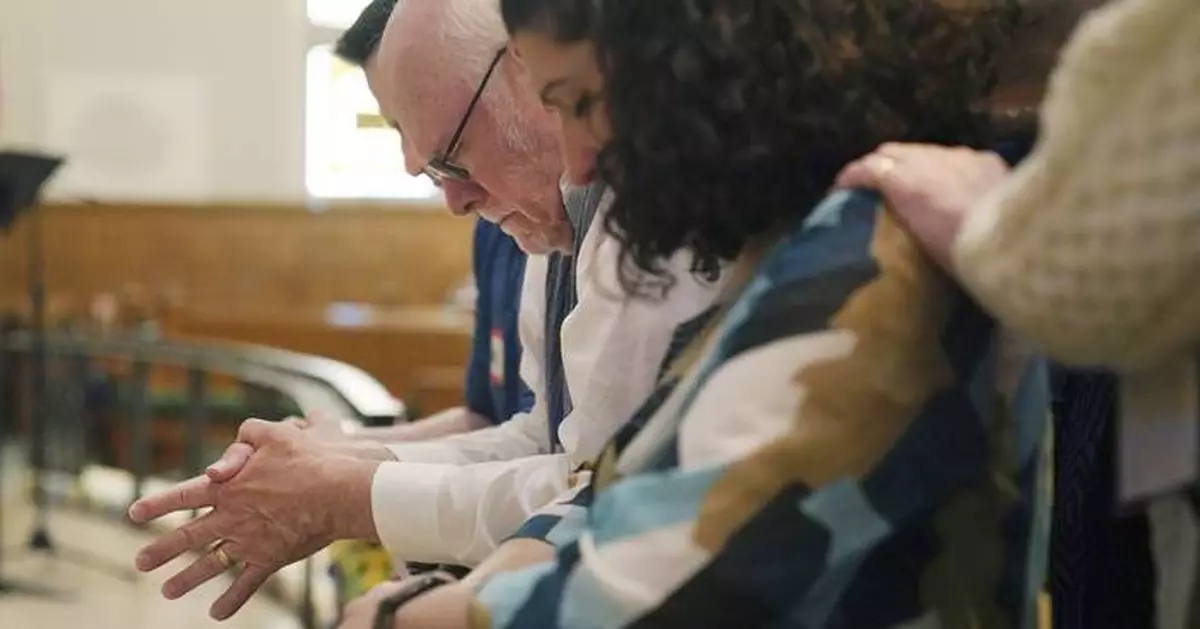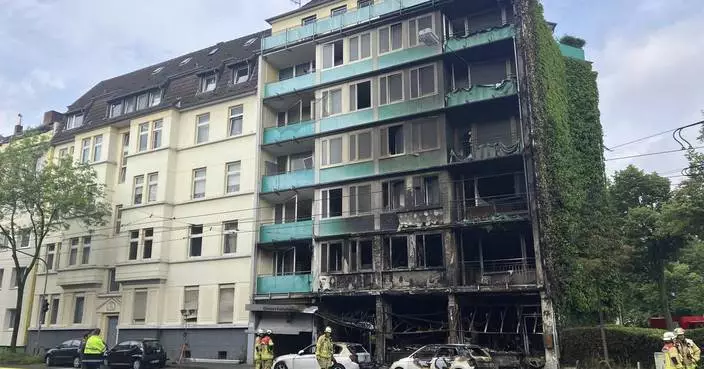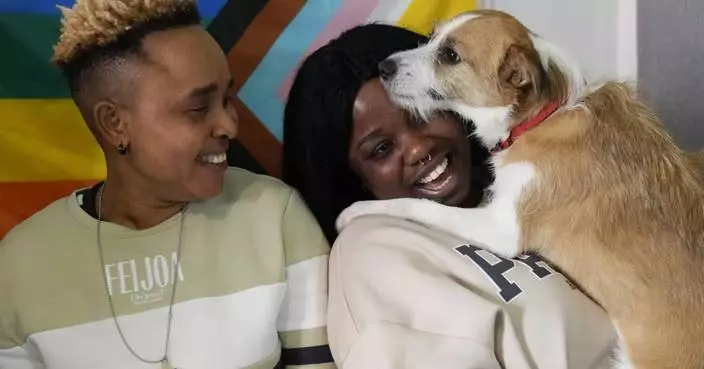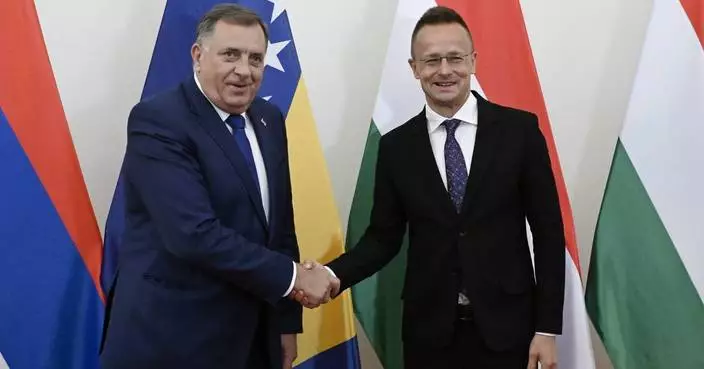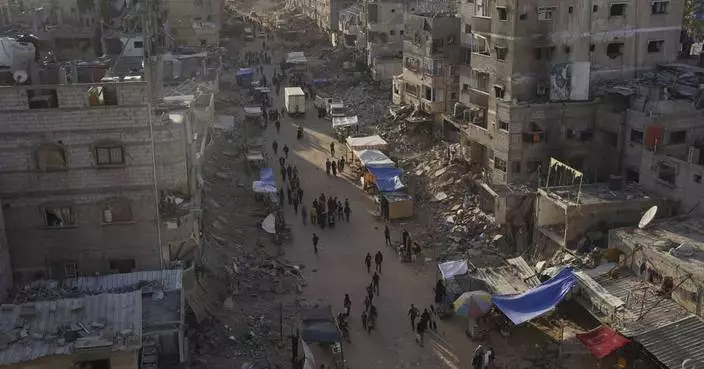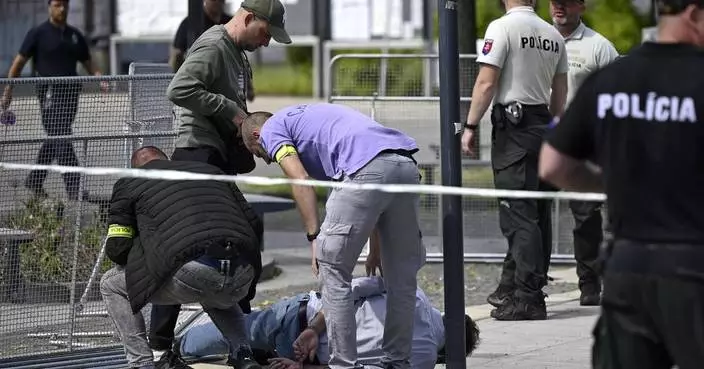CHARLOTTE, N.C. (AP) — United Methodist delegates are heading into the homestretch of their first legislative gathering in five years — one that appears on track to make historic changes in lifting their church's longstanding bans on same-sex marriage and the ordination of LGBTQ clergy.
After a day off on Sunday, delegates to the General Conference of the United Methodist Church resumed their work Monday and will be meeting all this week before wrapping up their 11-day session on Friday
They've already begun making historic changes: On Thursday, delegates overwhelmingly endorsed a policy shift that would restructure the worldwide denomination into regional conferences and give the U.S. region, for the first time, the same right as international bodies to modify church rules to fit local situations.
That measure — subject to local ratification votes — is seen as a way the U.S. churches could have LGBTQ ordination and same-sex marriage while the more conservative overseas areas, particularly the large and fast-growing churches of Africa, could maintain those bans.
But whether that measure maintains church unity remains to be seen. The General Conference comes as the American portion of the United Methodist Church, long the nation's third-largest denomination, has shrunk considerably. One-quarter of its U.S. churches left between 2019 and 2023 amid conservative dismay over the church's failure to enforce its LGBTQ bans amid widespread defiance.
A proposal to overturn those bans is headed to the delegates this week, and progressives are optimistic that they have the votes to realize their long-held dream.
Bishop Karen Oliveto of the Mountain Sky Episcopal Area, the first openly lesbian bishop ordained in the church, said the tenor of the current conference is positive.
“The delegates are listening to each other, learning from each other, really providing a foundation for the work this week,” she said. “There have been hard conversations, but again this tone that we’re in this together. And we have a witness to make to the world that’s unified even in the midst of cultural differences.”
The denomination has debated homosexuality for more than half a century. Its Book of Discipline bans “self-avowed practicing homosexuals” from the clergy and forbids clergy from presiding at same-sex marriages. It also forbids church funding of any advocacy for the “acceptance of homosexuality.”
But legislative committees last week overwhelmingly approved several proposals liberalizing the church’s stance on sexuality. They included one committee that voted 43-9 to overturn the ban on LGBTQ clergy.
The delegates will also vote on a new set of Social Principles — a wholesale revision of an existing set of non-binding statements — which also received overwhelming committee approval last week. The new version omits the previous version's declaration that homosexuality is “incompatible with Christian teaching." And it defines marriage as a sacred covenant between “two people of faith,” without specifying gender.
Such changes could portend a further fragmentation of the international church. Delegates last week approved the departure of a small but notable part of the body — about 30 churches in Russia and other former Soviet countries, where conservative views on LGBTQ issues are strong.
Some are proposing that African and other churches be given the same chance that U.S. churches recently had to disaffiliate under favorable terms, including U.S. churches that missed the earlier deadline to do so, but a committee vote recommended against such measures.
Opponents say they already have mechanisms to depart, as some have recently done, but proponents say existing rules are burdensome.
Jerry Kulah of the advocacy group Africa Initiative said that while it will be up to individual conferences in Africa to decide whether to stay or leave the denomination, he believes it's time to leave.
“We cannot remain in this marriage,” he said. “We can’t be one church preaching different gospels.”
A large majority of African bishops, while affirming their opposition to LGBTQ ordination or marriage, have said in a joint statement they are committed to remaining in the United Methodist Church.
The denomination had until recently been the third largest in the United States, present in almost every county. But its 5.4 million U.S. membership in 2022 is expected to drop once the 2023 departures are factored in.
The denomination also counts 4.6 million members in other countries, mainly in Africa, though earlier estimates have been higher.
Conservative advocacy groups say U.S. churches that didn't meet the 2023 deadline should have the option of disaffiliating, too — along with the more than 7,000 that have already done so.
The denomination also will be debating policy stances regarding fossil fuels and other issues as well as voting on major budget cuts to denominational programs, reflective of losing thousands of congregations.
The Rev. Tracy Cox, lead pastor of First United Methodist Church in Pittsburgh, said she’s cautiously hopeful for changes to the rules on ordination and marriage. The congregation, which has long been LGBTQ-affirming, held a commissioning service on April 14 for those attending the General Conference.
“If you are called by God to be an ordained elder or deacon, no church, no institution should step in that way,” Cox said. “And as far as marriage goes, when somebody falls in love with someone, we need to be able to help them to raise a family or to be a family in the community where they’re going to serve.”
Added Tracy Merrick, a member of the congregation and a delegate: “It will say to the world about us that we really stand behind our statement that we are a church of open hearts, open minds, and open doors.”
Associated Press religion coverage receives support through the AP’s collaboration with The Conversation US, with funding from Lilly Endowment Inc. The AP is solely responsible for this content.
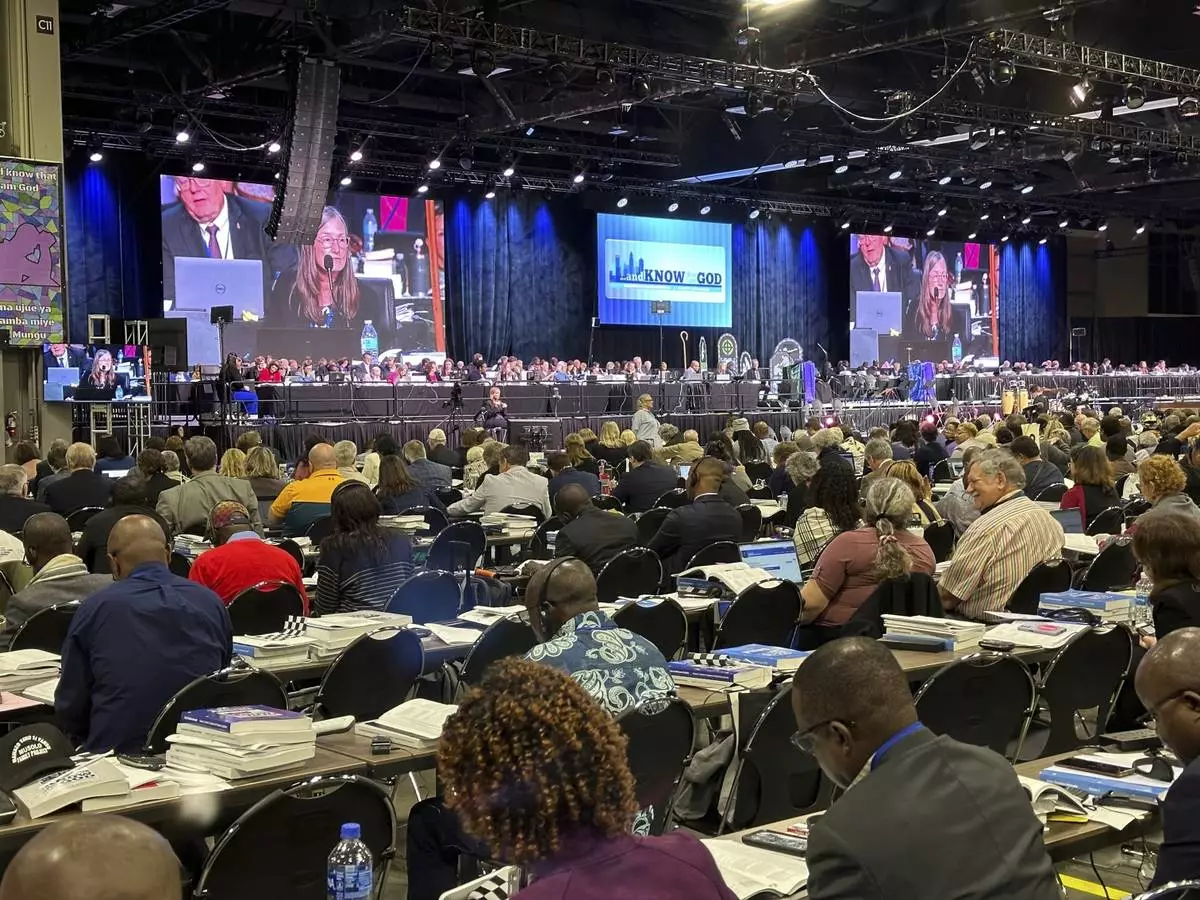
Corrects Photographer ID: Bishop Sandra Steiner Ball presides at a session of the General Conference of the United Methodist Church on Monday, April 29, in Charlotte, N.C. (AP Photo/Peter Smith)
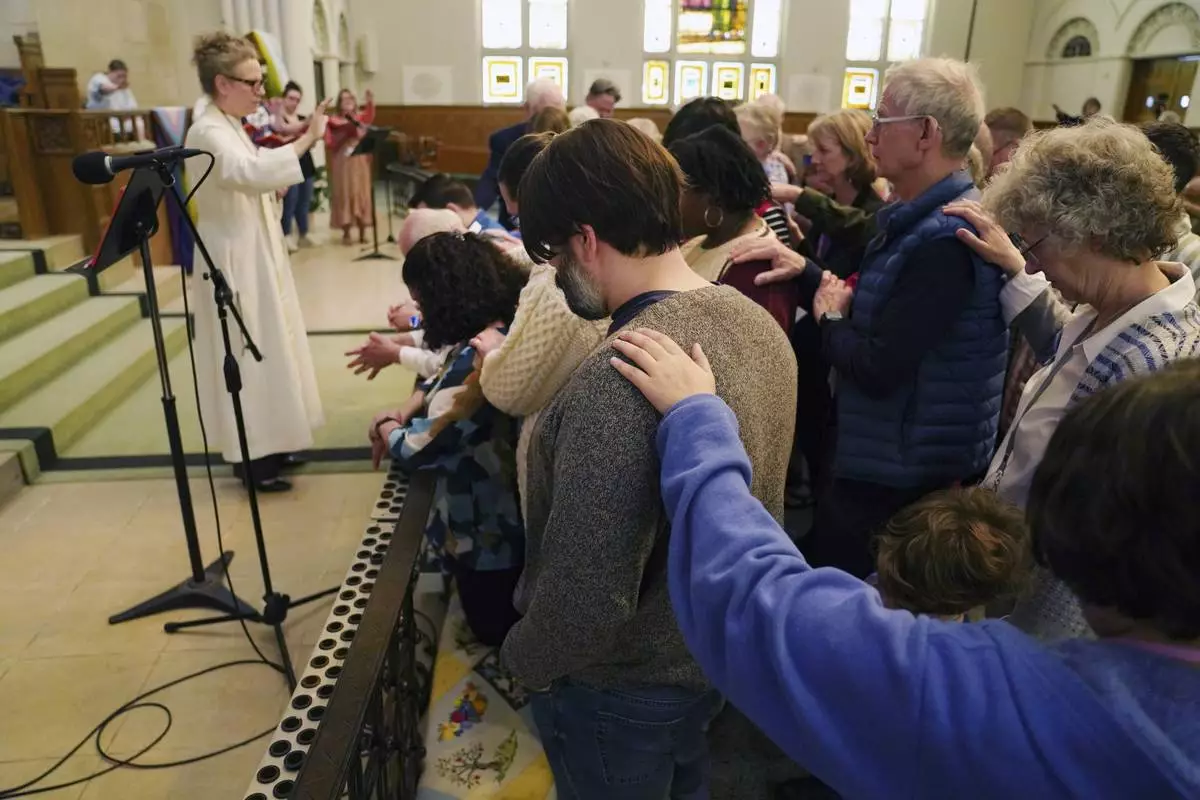
The Rev. Tracy Cox of First United Methodist Church, left, and members of her congregation pray for Tracy Merrick, a delegate representing Western Pennsylvania at the United Methodist General Conference, as well as The Rev. Anais Hussian and Joshua Popson, Sunday, April 14, 2024, in Pittsburgh. Hussian is a reserve delegate at the General Conference and Popson is advocating for LGBTQ inclusion with the Love Your Neighbor Coalition. The 11-day conference is the denomination's first legislative gathering since a special session in 2019. (AP Photo/Jessie Wardarski)
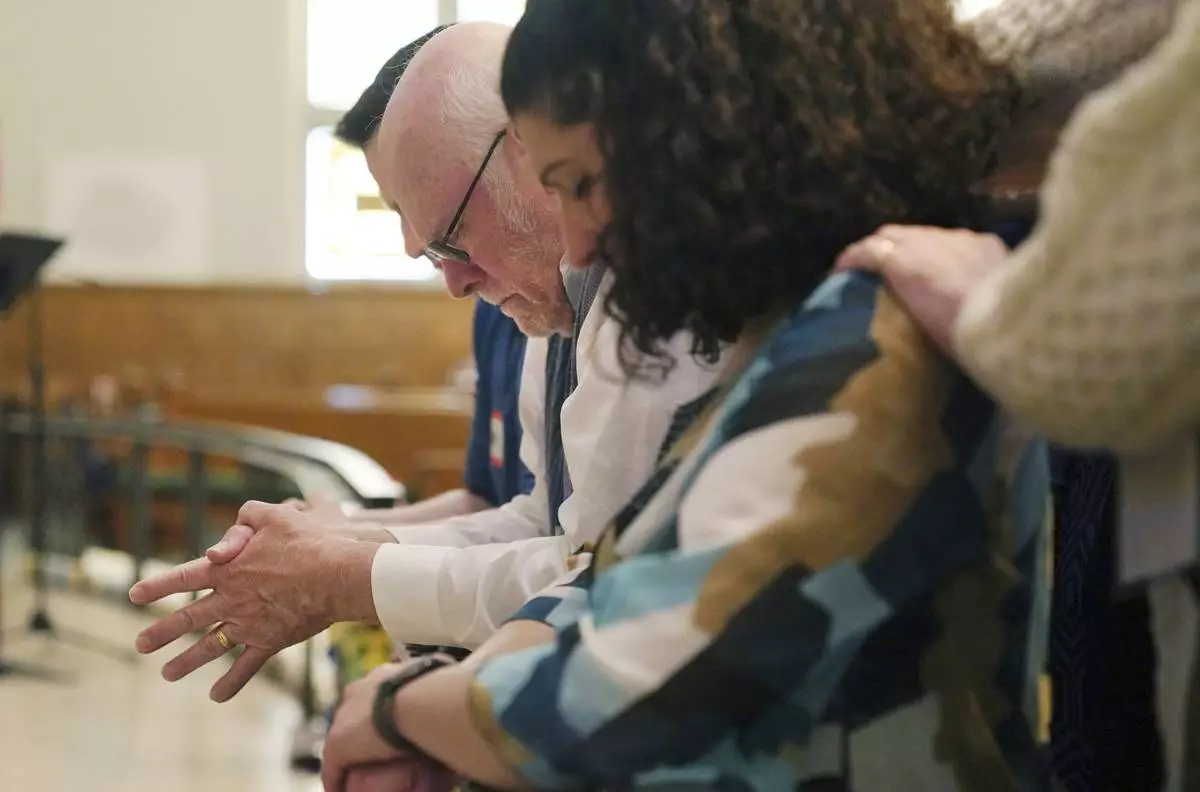
First United Methodist Church congregants pray for members attending the United Methodist General Conference, including Tracy Merrick, left, a delegate representing Western Pennsylvania, The Rev. Anais Hussian, a reserve delegate, and Joshua Popson, who is advocating for LGBTQ inclusion with the Love Your Neighbor Coalition, Sunday, April 14, 2024, in Pittsburgh. The 11-day conference is the denomination's first legislative gathering since a special session in 2019. (AP Photo/Jessie Wardarski)
JERUSALEM (AP) — At first, it seemed like the kind of shooting that has become all too common in the Israeli-occupied West Bank. A Palestinian aroused suspicions and an Israeli soldier killed him.
But then the deceased was identified as David Ben-Avraham, a Palestinian who had made the almost unheard-of decision to convert from Islam to Judaism years earlier.
His unusual journey had taken him across some of the deepest fault lines in the Middle East and led to some unlikely friendships. Most Palestinians saw him as an eccentric outcast, while many Israelis treated him as an unwelcome convert to a religion that doesn’t proselytize.
But in his final moments, he was once again viewed as a Palestinian who was in the wrong place, at a time of widespread anger and suspicion.
He was born Sameh Zeitoun in Hebron, home to some 200,000 Palestinians as well as hundreds of Jewish settlers who live in enclaves guarded by Israeli troops. Tensions have run high for decades, often spilling over into violence.
Rights groups have long accused Hebron’s settlers of harassing Palestinian residents, and Palestinians have committed a number of stabbing and shooting attacks against Israelis over the years.
At its most extreme, the bitter neighbors live just a few meters apart. In some narrow alleys of Hebron’s Old City, metal netting protects Palestinian shoppers from objects thrown by settlers living on the upper floors.
Zeitoun first made contact with Jewish settlers over a decade ago, asking for help converting to Judaism, according to Noam Arnon, a Jewish settler in Hebron who went on to befriend him.
He said Zeitoun was inspired by family stories about his grandfather protecting Jews when riots erupted in 1929, when the Holy Land was under British colonial rule. Palestinians killed dozens of Jewish residents in the city.
“He went further, not only to live as a good neighbor but to join the Jewish community,” Arnon recounted.
Conversion to other faiths is deeply frowned upon in Islam. In much of the Muslim world, those who do so are cast out of their communities, sometimes violently. Judaism, unlike Islam and Christianity, has no tradition of proselytization.
Such a conversion is even more fraught in Israel and the Palestinian territories, where religion and nationality usually overlap in a decades-old conflict. Judaism is the faith of most of the soldiers who patrol the territory and the settlers whom Palestinians see as hostile colonizers.
Arnon said most of the settlers from Hebron’s tight-knit community refused to accept Ben-Avraham. Only Arnon and a few others interacted with him, helping with his conversion application papers.
Religious conversions are rare but legal in areas administered by the semi-autonomous Palestinian Authority. Most are undertaken by Palestinian Christians converting to Islam for marriage.
In Israel, converting to Judaism requires an application to the government-run Conversion Authority. Ben-Avraham submitted two requests in 2018 but did not meet the requirements, according to a government official who was not authorized to speak with media and spoke on condition of anonymity.
With that pathway closed, Ben Avraham turned to Israel’s insular ultra-Orthodox community and eventually made his conversion official in 2020, according to documents published online.
In the year before his conversion, Ben-Avraham was detained by the Palestinian Authority’s intelligence unit in Hebron, according to Arnon and a local Palestinian activist, Issa Amro.
The reason for his arrest was never publicly disclosed, but they believe his conversion and open connections with Israelis attracted unwanted attention.
Palestinians can face arrest or even death if they're seen as collaborating with Israeli authorities. But few would have suspected Ben-Avraham of being an informant because his story was widely known.
Ben-Avraham told the Israeli news site Times of Israel that he was held for two months in solitary confinement and beaten before being released. Around that time, a video emerged showing him holding what appears to be a Quran and pledging his Muslim faith.
Arnon and Amro said his statement was likely made under duress during detention. The PA’s prosecution office said it had no information about his case.
After his release, Ben-Avraham moved in with Haim Parag, a Jewish friend who lived in Jerusalem. He returned to Hebron infrequently because of safety concerns and continued his Jewish studies. Parag said the pair regularly prayed together at a nearby synagogue.
“He was like a son to me,” he said.
Parag also said he met Ben-Avraham’s wife and some of his children, and that several close family members maintained a relationship with him even after his conversion.
The Zeitoun family declined to speak with The Associated Press, fearing reprisal. In the end, Ben-Avraham left little public record of what drove his personal convictions.
Ben-Avraham was waiting outside a West Bank settlement for an Israeli bus to take him to Parag’s apartment March 19 when he got into an argument in Hebrew with an Israeli soldier.
Across the West Bank, Jewish settlers live apart from Palestinians in guarded settlements where they're subject to different laws. Palestinians are generally barred from entering settlements unless they have work permits.
“Are you Jewish?” the soldier shouts in a video that circulated online and appears to have been shot by his body camera.
“Of course,” Ben Avraham answers.
“What’s your name?” the soldier says.
“David.” he replies.
“David?” the soldier says.
“Ben-Avraham, stupid.”
The soldier then orders Ben-Avraham to step away from his bag on the ground and raise his hands in the air, before saying sarcastically, “Jewish.”
A second video, apparently taken from a nearby security camera, appears to show two soldiers shooting Ben-Avraham from a close distance as he keels over backward onto the sidewalk.
The army said a small knife was found in Ben Avraham’s bag after the shooting. Parag said he gave him the knife for self-defense.
The Israeli army said it's investigating the shooting, but rights groups say soldiers are rarely held accountable in such situations.
Israeli forces have been on high alert as the West Bank has seen a surge of violence linked to the war in Gaza. Nearly 500 Palestinians have been killed by Israeli fire since the war's start, according to the Palestinian Health Ministry. Many have been shot dead in armed clashes during military raids, others for throwing stones at troops, and some who were posing no apparent threat.
Palestinians have also carried out several stabbing and other attacks against Israelis.
Arnon said the shooting was a tragic misunderstanding. Parag, Ben-Avraham's friend in Jerusalem, accused the soldiers of racial profiling, saying they saw Ben-Avraham for his background and not his unexpected beliefs.
Even in death, Ben-Avraham’s identity was contested.
Parag and another Israeli friend asked an Israeli court for the body to buried him at a Jewish cemetery, filing a petition against members of the Zeitoun family who wanted a Muslim funeral. Bezalel Hochman, a lawyer representing the two Israelis, said the Tel Aviv family court ruled in their favor.
After his death caused a public outcry, the Interior Ministry granted him Israeli residency, saying it wanted “to fulfill the will and desire of the deceased to be part of the nation of Israel.”
Ben Avraham was buried in April in a Jewish cemetery on the foothills of Mount Gerizim, near the Palestinian city of Nablus, Parag said. The hilltop is sacred for Samaritans — a small, ancient religious minority that straddles the Palestinian-Israeli divide, just like Ben-Avraham.
No one from the Zeitoun family attended the funeral, said Parag, who's designing his friend’s gravestone.
He said it will read: “David Ben-Avraham Zeitoun Parag. The Holy Jew.”
Associated Press writer Tia Goldenberg in Jerusalem contributed to this report.
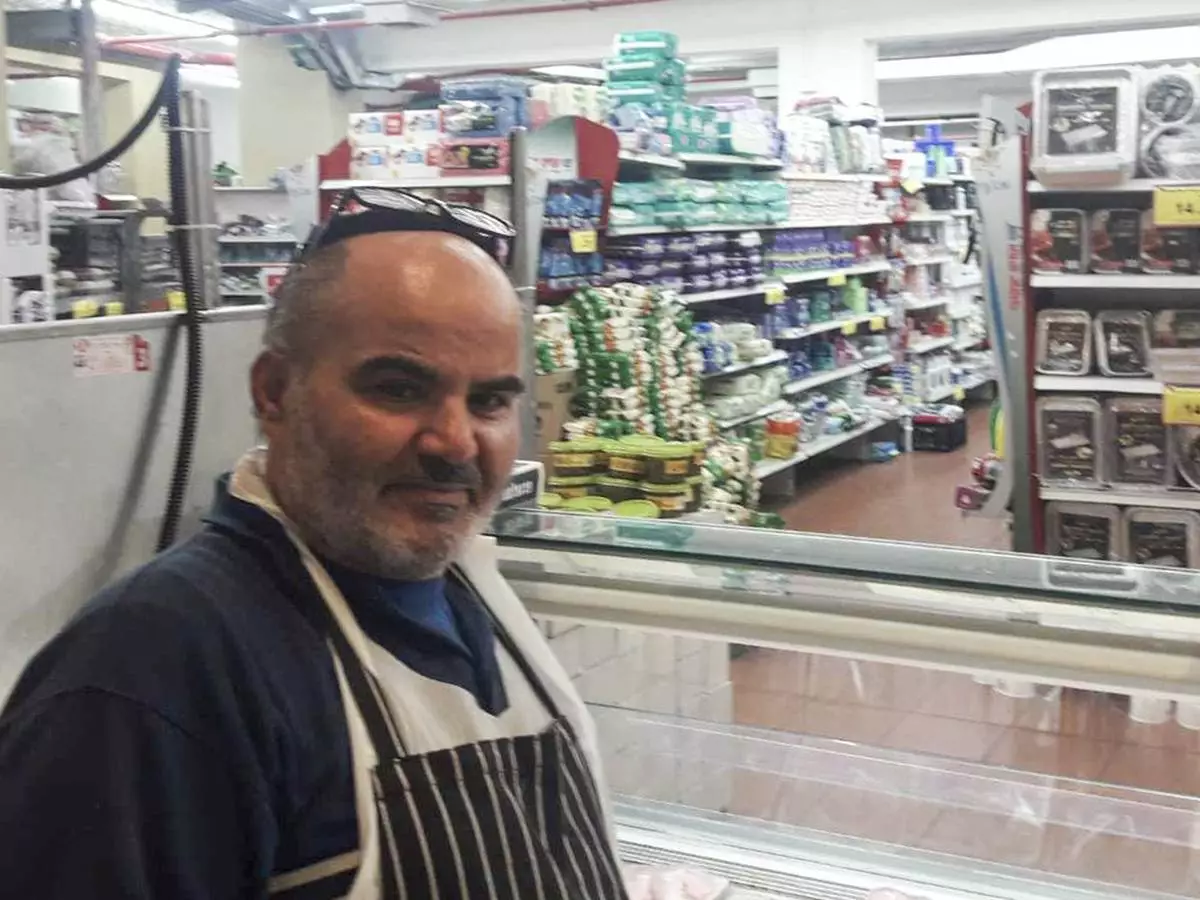
This 2021 photo provided by Haim Parag shows David Ben-Avraham at a supermarket in the Israeli town of Beit Shamesh, where he briefly worked, in Jerusalem. Ben-Avraham, a Palestinian who was born a Muslim but made the almost unheard-of decision to convert to Judaism years earlier, was fatally shot by an Israeli soldier. (Courtesy of Haim Parag via AP)





